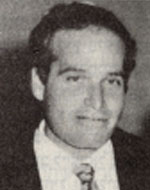Gideon, son of Chana and Moshe, was born on August 16, 1942 in Afula, where he studied at the Bialik Elementary School in Kiryat Bialik and later attended the high school in Kiryat Haim and when his family moved to Petah- Tikva continued his studies at the YH Brenner High School and passed the matriculation exams in the summer of 1960. Gideon was a quiet student and liked his teachers and classmates. His activity in social affairs and in the affairs of the movement often stole the attention he needed to devote to studies. From his childhood, he joined the Hashomer Hatzair youth movement in the Kiryat Haim branch. A life of equality and equality, as they found expression in kibbutz life, appealed to him and aroused him to extensive social activity. Social and ideological problems often led to heated arguments with his classmates and his brothers. In elementary school, Gideon often appeared in the drama club and even wrote with his friend Ilan a kind of radio play called “The Youth – Where to?” He was usually a quiet, closed boy, but did not make anyone around him affected by his mood. He always tried not to give external expression to his personal problems, and because of this quality, which was one of the most prominent in his qualities, he did not awaken his parents and disturb them when he needed urgent hospitalization. Gideon was a man of action, willing to implement his ideas and opinions. When he was in seventh grade, he decided to join the Nahal paramilitary unit immediately after graduation, and his mother said: “I used to tell Gideon that he behaved like a Jesus. When he gets a slap he tends to extend his other cheek. He was modest and never required special things. He had a long-standing desire to run a house outside the city, in a quiet moshav, and to engage in the work of the land. “Gideon was drafted into the IDF in August 1960 as part of the Nahal Brigade of Hashomer Hatzair After serving as a parachutist, he served with his friends in Kibbutz Lehavot Habashan and was a well-known soldier who was well-liked by his teammates and was well-known for his ideals. He spent many hours with his apprentices, helped them with everything, and as his parents testify, he spent nights and days in his job, which he saw And at the end of his regular service, Gidon responded to his father’s request to help with the burden of earning a living and helped him establish a chemical plant to produce pesticides for agriculture. Gideon, who loved the country and its landscapes, enjoyed his studies very much, and in 1971, after passing the final exams, he was awarded a “university graduate.” After graduating, he set out on his first trip to America and enjoyed a lot of visits to remote places. Geography. After returning to Israel in 1972, he worked as a foreman for a chemical department and contributed greatly to raising productivity. He inquired about the way of life and the situation of the workers, visited their homes and enjoyed the customs of the various communities. In the summer of 1973, Gideon embarked on another trip abroad and visited an international exhibition of chemistry in Germany. He intended to open his own factory and brought his chemist father to take an interest in a German company that deals with pollution of seawater. In the course of time, after his fall, his father took upon himself to represent the Israeli society. Following his trip abroad, after closely observing new products and methods, Gideon toured with friends in Scandinavia and France and returned to Israel in September.When the Yom Kippur War broke out, Gideon was called to his infantry unit. His family tells of his encouragement. He was quiet and reassured his loved ones. Gideon fought as a machine gunner on the southern front and took part in the braking battles. About ten days after the fighting broke out, he returned home. “The vacation was short,” said his sister Edna. “He bathed, ran to visit a friend, his eyes were burning, he was so excited and Yaffa …” On the afternoon of October 20, 1973, Gideon was shot to death by an Egyptian commando company on the outskirts of the city of Ismailia . He was laid to rest in the cemetery in Rehovot. Survived by his parents, brother and sister. After his fall, he was promoted to sergeant. In a letter of condolence to the bereaved family, the commander of the unit wrote: “Gideon was one of the oldest soldiers in our army, and during the wars of attrition and reserve duty along the lines, ; ” His friend Pinchas Cohen Gan wrote in his letter to the parents: “In my conversations with Gideon about art and life, I did not need complicated sentences or slogans in order to explain my relationship to things: masks or pretenses were not our business. Slowly but thoroughly, beauty was his own private affair, and it seems to me that this was part of his worldview – the beauty as reflected by nature, the landscape, the person. “
